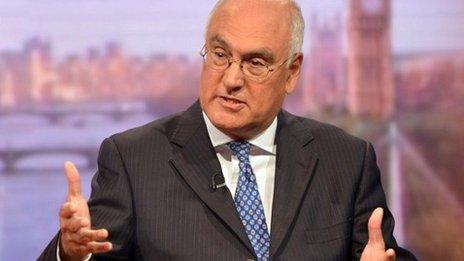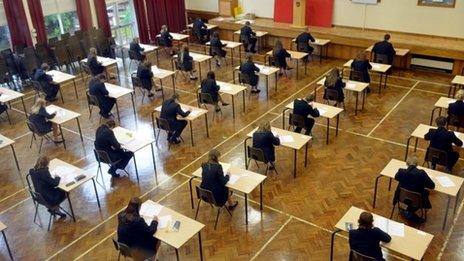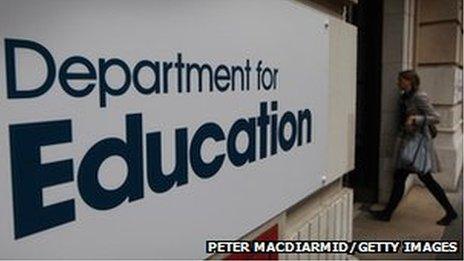E-Act chain loses control of 10 academy schools
- Published
Nick Hindmarsh, head teacher, Dartmouth Academy: "The timing's shocking for us"
One of the biggest chains of academies in England is to lose control of 10 of its schools.
The decision was made after Ofsted inspectors raised serious concerns about the performance of some schools run by the E-Act academy chain.
E-Act will remain in control of the further 24 academies in its chain, while officials work to find different sponsors for the 10 schools affected.
Education Secretary Michael Gove said it was vital chains be held to account.
E-Act, which now faces the loss of a third of its schools, was subject to a mass inspection of its schools by the Ofsted watchdog, with almost half being recently inspected.
Mr Gove told the BBC that most academy trusts had been successful in bringing about improvement.
"But it's also right that they should be held to account - and both academy trusts and local authorities have, in the past, been ineffective, at times, in bringing about the rate of change and the speed of change required.
"So where they have been less than effective, we've decided that it's appropriate that action be taken."
Financial investigation
But Chris Keates, leader of the Nasuwt teachers' union said: "This 'pass the parcel' strategy is no way to treat children, staff and schools or to support school improvement."
And Kevin Courtney, deputy leader of the National Union of Teachers, said it showed "changing the status of a school does not improve results".
Academy schools
Total number in England
3,657
(1 Feb 2014)
55%
of all secondaries
-
Academies are independent state-funded schools
-
Funded direct from central government, rather than local authority
-
First set up by Labour to help struggling schools, but scheme since opened to all
A Department for Education spokesman said officials were working with E-Act to find different sponsors for the 10 schools in question.
The spokesman said it had urged the academy provider to reduce its number of academies, but the decision was taken by E-Act.
The DfE has so far not confirmed the identity of the schools, saying it was for E-Act to tell parents.
But they are believed to include Trent Valley, Sherwood, Dartmouth, Forest, Leeds East and Leeds West academies.
Michael Gove: "It's right that academies should be held to account"
Nick Hindmarsh, head of Dartmouth Academy in Devon said that his school is improving and about to move into new buildings next term - and that this dispute over the sponsor was a "huge distraction".
The problems were about the sponsor and not the school, he argued, and that it would be "business as usual" for the school.
An official statement from E-Act said it was working with the DfE to "identify where we are best placed to make a significant difference to our academies".
A source close to E-Act said the schools being removed from its control were not being chosen because of poor performance.
Instead it reflected where E-Act was less able to support schools - including factors such as their geographical spread across the country.
Such sponsored academies are state funded, but are part of chains run by academy providers.
Academy providers are not-for-profit trusts that run groups of schools. More than 50% of secondary schools in England are now academies.
The decision to remove these schools from E-Act follows recent inspections of 16 of their schools by the Ofsted watchdog.
'Extravagant expenses'
The academy provider faced heavy criticism last year in a report from the financial inspectorate, the Education Funding Agency, which warned of a culture of extravagant expenses.
The decision to limit E-Act is likely to raise further questions about the oversight of academy schools and the chains which run some of them.
There are now 566 approved academy sponsors - although many of them will only run a small number of schools.
The Ofsted chief Sir Michael Wilshaw has said that academy chains should be open to the scrutiny of Ofsted inspections - in the same way that local authority services can be inspected.

Sir Michael Wilshaw wants academy chains to be open to the scrutiny of Ofsted
Jonathan Simons, head of education at the Policy Exchange think-tank, also says "it is vital that academy chains be inspected by Ofsted, and that data on sponsor performance should be available for scrutiny".
But he says it would be "wrong to use this case to call for schools to remain under local authority control" when academies were helping to raise standards.
A Department for Education spokesman said that Ofsted already can "inspect a number of academy schools from the same chain in one batch if they wish".
"As we have seen with E-Act, these arrangements already allow underperformance in academy chains to be swiftly identified and addressed. This shows the present system is working, allowing both individual schools and academy chains to be held effectively to account.
"We welcome E-Act's decision to hand over a number of their academies to new sponsors.
"We hope this will mean E-Act can focus on raising standards in their remaining schools."
Shadow Education Secretary Tristram Hunt said: "Michael Gove is allowing underperformance to go unchecked in academy schools and free schools.
"The complete lack of oversight has meant poor standards of education are allowed to set in. Michael Gove is refusing to take the action that is needed to prevent standards slipping."
- Published17 May 2013

- Published6 February 2014

- Published7 May 2016

- Published3 February 2014

- Published16 January 2014
